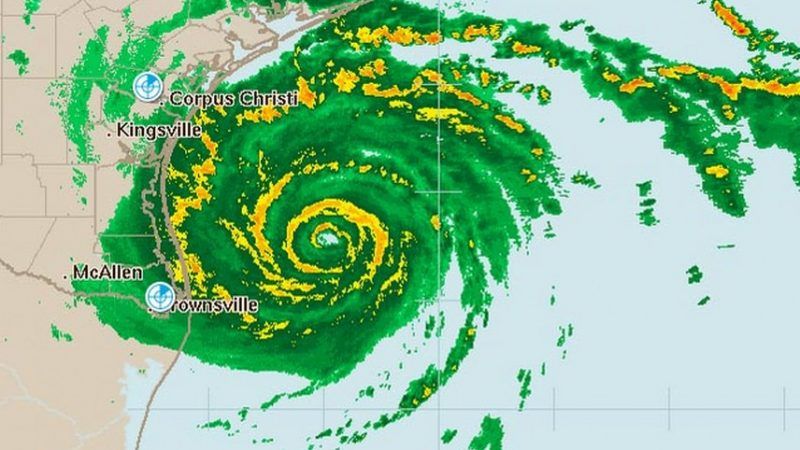7 Things Donald Trump Shouldn't Do After Hurricane Harvey
The federal government is awful at handling disasters. Can we try not to screw it up this time?


Hurricane Harvey is headed for the Texas coast, and residents are running out of time to minimize the damage from natural forces. But the bulk of the man-made damage hasn't yet been inflicted.
Politicians and bureaucrats are donning their hipwaders as we speak, ready to stage Federal Emergency Management Agency (FEMA) photo-ops (oh look, they've already gotten started!), hand out taxpayer dollars, and—as often as not—expensively and time-consumingly muck things up for people who are suffering the most.
President Donald Trump has been tweeting up a storm about the storm and he's had a rough couple of weeks/months, so he's likely to do what he can to maximize his Harvey bump.
Here are a few things Trump and his pals absolutely shouldn't do in the immediate aftermath of the hurricane, but probably will:
1) Accuse people selling water or fuel in storm-hit areas of price gouging. Many of the folks who take on the risk of heading into an unstable area do so because they are driven by the twin motivations of fellow-feeling and greed. These people are often the fastest and most effective at getting supplies where they are most needed, because that's also where they can get the best price. This is just as true for Walmart as it is for the guy who fills his pickup with Poland Spring and batteries. Don't use the bully pulpit to vilify disaster entrepreneurs, small or large.
2) Establish a central command for volunteers. One of the tragic lessons of Hurricane Katrina was that by trying to control who gets into a storm zone to help, governments can wind up blockading good people who could do good while waiting for approval from Washington in a situation where communications are often bad. Ordinary people see and know things about what their friends and neighbors need and want that FEMA simply can't be expected to figure out.
3) Fearmonger about civic breakdown and looting. After storms, Americans are typically cooperative and law-abiding. Unfounded fear of looting makes people stay in their homes when they are in danger, return too quickly after the storm passes, and regard each other with distrust at a moment when solidarity is most needed. And there's corollary to this one:
3a) Confiscate guns. Emergency workers and law enforcement shouldn't waste post-storm effort rooting around in people's homes for firearms. Law-abiding gun owners do not, by and large, turn into characters from Grand Theft Auto when they get wet.
4) Throttle entry and exit from the storm zone by keeping immigration checkpoints open. Nothing is classier than having the Border Patrol asking people who have just lost everything—including their important papers—for their papers, please.
5) Insist on managing housing for the displaced. After storms, Americans look for ways to reach out and help. Many would open their homes to people who need a place to stay. Private charities can help broker these placements, as they do now for international refugees.
6) Let bureaucracy stand in the way of communities rebuilding on their own. After a storm, getting schools and hospitals up and running requires speed. That means waiving bureaucratic requirements. Requiring citizens to push paper in order to get their communities functioning again is wasteful even in non-crisis situations, but can be especially painful for cities whose infrastructure has washed away.
7) Increase funding for the federal flood insurance program. When it comes time to rebuild, everyone will studiously avoid discussing the fact that maybe we shouldn't be using a massive federal insurance program to incentivize building in areas that are repeatedly hit by storms. There's a reason private insurers don't offer policies to many coastal dwellers, and it ain't "market failure." (This seems ungenerous to say in the moment when people are facing the loss of their homes and businesses, but it'll be even harder to say or hear after the storm hits.)
Nearly all of these points are drawn from "After the Storm," a incredible roundup of responses to Hurricane Katrina that is brimming over with lessons. Go read the essays by Jacob Sullum, Jesse Walker, Ronald Bailey, Kerry Howley, Jeff A. Taylor & David B. Kopel.
In fact, Reason has been covering state screwups in the post-disaster window for decades. Here are some tidbits from our archive to read while nervously refreshing Weather Underground.
- "Disastrous Relief," by Jacob Sullum, January 1990
- "Reaping the Whirlwind: Hurricane Andrew was a godsend for Politicians. The last thing they want is a premature recovery," by Glenn Garvin, January 1993
- "Gouge Away: Hurricanes and the politics of prices," by John Hood, December 1996
- "Confessions of a Welfare Queen," by John Stossel, March 2004
- "Another Example of Government Failure: Coastal Living," by Ronald Bailey, September 2008
- "Battered by Ike," by Jesse Walker, September 2008
- "Disaster Utopianism: Looking for paradise in catastrophic places," by Jesse Walker, May 2010
- "Congress Votes to Continue Flood Insurance Folly," by Ronald Bailey, July 2011
- "After the Storm: How Joplin, Missouri, rebuilt following a devastating tornado by circumventing bureaucracy," by Tate Watkins, August 2012
- "The 7-Step Guide to Our Idiotic Disaster-Relief Politics," by Matt Welch, May 2013
- "Disasters Should Be Dull," by Stefanie Haeffele-Balch and Dan Rothschild, February 2017


Show Comments (48)